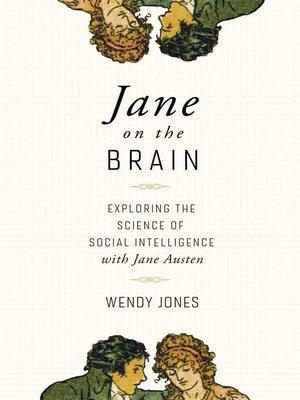Jane on the Brain
ebook ∣ Exploring the Science of Social Intelligence with Jane Austen
By Wendy Jones

Sign up to save your library
With an OverDrive account, you can save your favorite libraries for at-a-glance information about availability. Find out more about OverDrive accounts.
Find this title in Libby, the library reading app by OverDrive.



Search for a digital library with this title
Title found at these libraries:
| Library Name | Distance |
|---|---|
| Loading... |
An Austen scholar and therapist reveals Jane Austen's intuitive ability to imbue her characters with hallmarks of social intelligence—and how these beloved works of literature can further illuminate the mind-brain connection.
Why is Jane Austen so phenomenally popular? Why do we read Pride and Prejudice again and again? Why do we delight in Emma's mischievous schemes? Why do we care that Anne Elliot of Persuasion suffers?
We care because it is our biological destiny to be interested in people and their stories—the human brain is a social brain, and Austen's characters are so believable that, for many of us, they are not just imaginary beings, but friends whom we know and love. And thanks to Austen's ability to capture the breadth and depth of human psychology so thoroughly, we feel that she empathizes with us.
Humans have a profound need for empathy, to know that we are not alone with our joys and sorrows. We see ourselves and others reflected in Austen's work.
Social intelligence is one of the most highly developed human traits when compared with other animals. How did it evolve? Why is it so valuable? Wendy Jones explores the many facets of social intelligence and juxtaposes them with the Austen cannon.
Brilliantly original and insightful, this fusion of psychology, neuroscience, and literature provides a heightened understanding of one of our most beloved cultural institutions—and our own minds.
Why is Jane Austen so phenomenally popular? Why do we read Pride and Prejudice again and again? Why do we delight in Emma's mischievous schemes? Why do we care that Anne Elliot of Persuasion suffers?
We care because it is our biological destiny to be interested in people and their stories—the human brain is a social brain, and Austen's characters are so believable that, for many of us, they are not just imaginary beings, but friends whom we know and love. And thanks to Austen's ability to capture the breadth and depth of human psychology so thoroughly, we feel that she empathizes with us.
Humans have a profound need for empathy, to know that we are not alone with our joys and sorrows. We see ourselves and others reflected in Austen's work.
Social intelligence is one of the most highly developed human traits when compared with other animals. How did it evolve? Why is it so valuable? Wendy Jones explores the many facets of social intelligence and juxtaposes them with the Austen cannon.
Brilliantly original and insightful, this fusion of psychology, neuroscience, and literature provides a heightened understanding of one of our most beloved cultural institutions—and our own minds.







